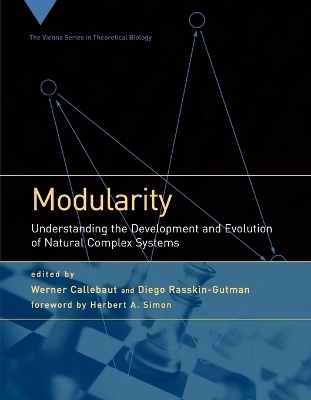
Modularity
Understanding the Development and Evolution of Natural Complex Systems
Seiten
2009
MIT Press (Verlag)
978-0-262-51326-5 (ISBN)
MIT Press (Verlag)
978-0-262-51326-5 (ISBN)
Experts from diverse fields, including artificial life, cognitive science, economics, developmental and evolutionary biology, and the arts, discuss modularity.
Modularity-the attempt to understand systems as integrations of partially independent and interacting units-is today a dominant theme in the life sciences, cognitive science, and computer science. The concept goes back at least implicitly to the Scientific (or Copernican) Revolution, and can be found behind later theories of phrenology, physiology, and genetics; moreover, art, engineering, and mathematics rely on modular design principles. This collection broadens the scientific discussion of modularity by bringing together experts from a variety of disciplines, including artificial life, cognitive science, economics, evolutionary computation, developmental and evolutionary biology, linguistics, mathematics, morphology, paleontology, physics, theoretical chemistry, philosophy, and the arts.
The contributors debate and compare the uses of modularity, discussing the different disciplinary contexts of "modular thinking" in general (including hierarchical organization, near-decomposability, quasi-independence, and recursion) or of more specialized concepts (including character complex, gene family, encapsulation, and mosaic evolution); what modules are, why and how they develop and evolve, and the implication for the research agenda in the disciplines involved; and how to bring about useful cross-disciplinary knowledge transfer on the topic. The book includes a foreword by the late Herbert A. Simon addressing the role of near-decomposability in understanding complex systems.
Modularity-the attempt to understand systems as integrations of partially independent and interacting units-is today a dominant theme in the life sciences, cognitive science, and computer science. The concept goes back at least implicitly to the Scientific (or Copernican) Revolution, and can be found behind later theories of phrenology, physiology, and genetics; moreover, art, engineering, and mathematics rely on modular design principles. This collection broadens the scientific discussion of modularity by bringing together experts from a variety of disciplines, including artificial life, cognitive science, economics, evolutionary computation, developmental and evolutionary biology, linguistics, mathematics, morphology, paleontology, physics, theoretical chemistry, philosophy, and the arts.
The contributors debate and compare the uses of modularity, discussing the different disciplinary contexts of "modular thinking" in general (including hierarchical organization, near-decomposability, quasi-independence, and recursion) or of more specialized concepts (including character complex, gene family, encapsulation, and mosaic evolution); what modules are, why and how they develop and evolve, and the implication for the research agenda in the disciplines involved; and how to bring about useful cross-disciplinary knowledge transfer on the topic. The book includes a foreword by the late Herbert A. Simon addressing the role of near-decomposability in understanding complex systems.
The late Werner Callebaut was Scientific Manager of the Konrad Lorenz Institute for Evolution and Cognition Research, Vienna, and Visiting Research Professor of Philosophy of Science at University of Vienna. Diego Rasskin-Gutman is Research Associate and Head of the Theoretical Biology Research Group at the Institute Cavanilles for Biodiversity and Evolutionary Biology, University of Valencia, Spain. Herbert A. Simon (1916-2001) was an influential psychologist and political scientist, awarded the 1978 Nobel Prize in Economics and the 1975 Turing Award (with Allen Newell). His many published books include Models of Bounded Rationality and Models of My Life (both published by the MIT Press)..
| Reihe/Serie | Vienna Series in Theoretical Biology |
|---|---|
| Vorwort | Herbert A. Simon |
| Zusatzinfo | 81 illus. |
| Verlagsort | Cambridge, Mass. |
| Sprache | englisch |
| Maße | 178 x 229 mm |
| Gewicht | 839 g |
| Themenwelt | Naturwissenschaften ► Biologie ► Evolution |
| Naturwissenschaften ► Biologie ► Genetik / Molekularbiologie | |
| ISBN-10 | 0-262-51326-9 / 0262513269 |
| ISBN-13 | 978-0-262-51326-5 / 9780262513265 |
| Zustand | Neuware |
| Haben Sie eine Frage zum Produkt? |
Mehr entdecken
aus dem Bereich
aus dem Bereich
Wie die Vernichtung der Arten unser Überleben bedroht - Der …
Buch | Softcover (2023)
Penguin (Verlag)
15,00 €


